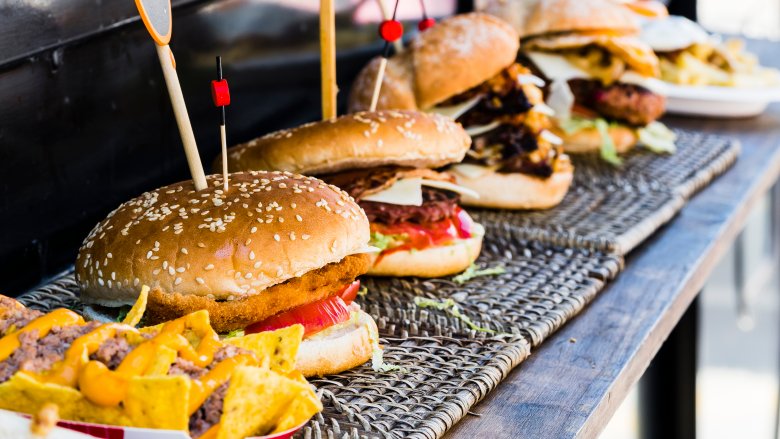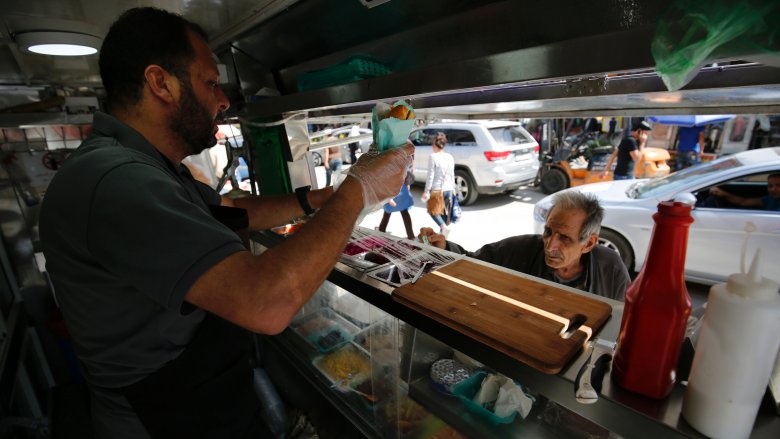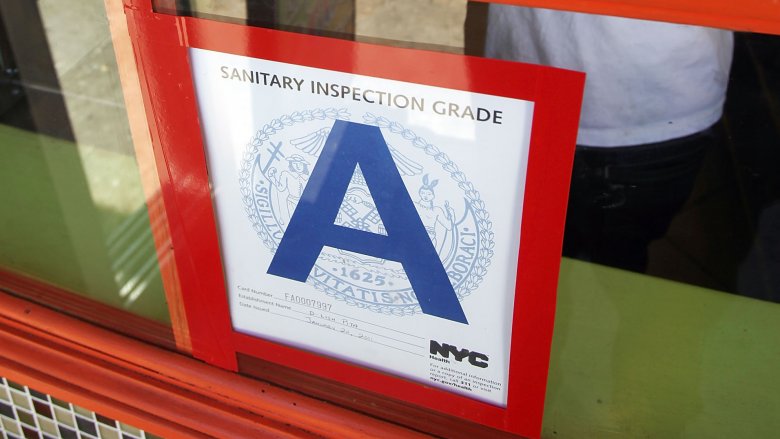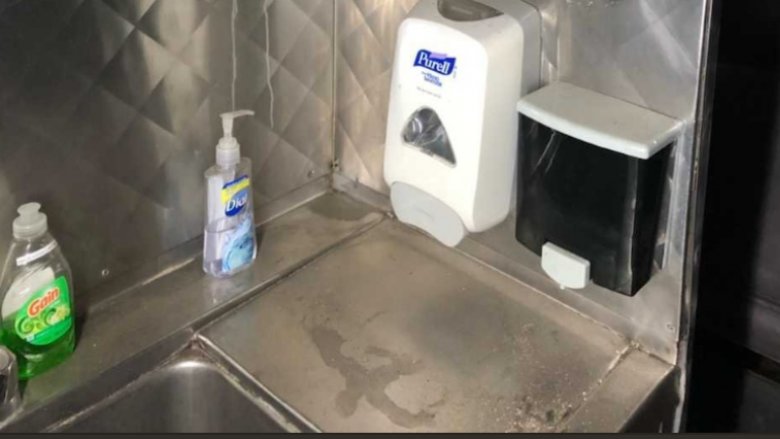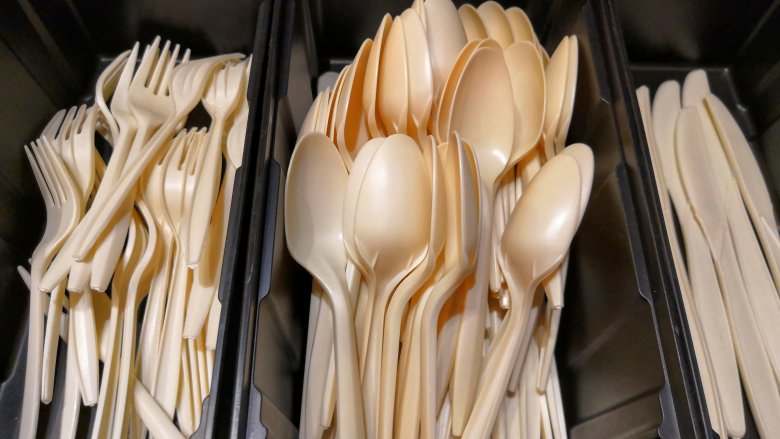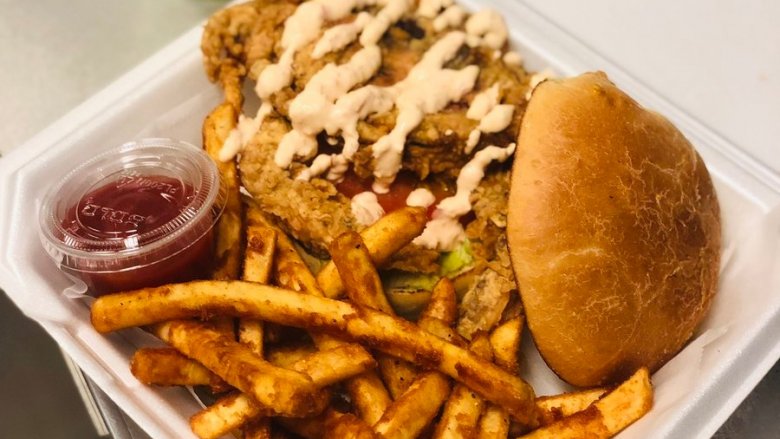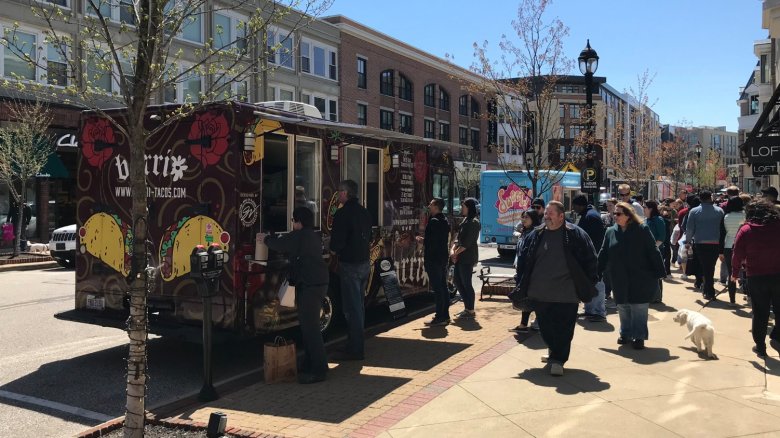Shady Facts Food Trucks Don't Want You To Know
In the early 2000s, food trucks burst onto the scene as the trendy younger sister of traditional brick and mortar restaurants. But the hipster hangouts that are known for designer donuts and sriracha on practically everything actually have a long history. Modern food trucks evolved from the chuck wagons of the Wild West that served meals to hardworking cowboys, as History.com explained. And with the invention of the automobile, ice cream trucks and hot dog carts were increasingly able to bring their goods directly to their customers.
Today's food truck industry is so much more than just simple hot dogs and ice cream. Chefs are pushing boundaries and taking risks with food, and customers are eating it up — literally. According to The Washington Post, food trucks were operating in over 300 cities in the United States as of 2018, and by that time had become a nearly $3 billion industry.
Food trucks can be a quick, convenient, and sometimes tasty way to explore new menus, but it's also a dining option that can come at a cost. So before you go crazy at that next street festival, there are some things you should know about food trucks that may cause you to have second thoughts. These are the reasons you should never order from food trucks — at least without knowing all the facts.
The food may not be stored safely on food trucks
Food truck operators know that to get their customers' orders out as quickly as possible they may have to do some of their prep work ahead of time. And that prepared food has to be stored inside the truck until it's needed. City health departments across the United States have set food storage guidelines to keep restaurant food as safe as possible. The New York City Department of Health states that cold food should be stored at or below 41 degrees Fahrenheit, while hot food should be kept at or above 140 degrees at all times to be considered safe — these temperatures help to prevent the growth of bacteria that could be dangerous to customers. And although a food truck refrigerator's temperature may not seem like a big deal, unsafe food storage practices can lead to illnesses such as norovirus and salmonella, according to Women's Health.
But even with these health guidelines in place, some food trucks aren't able to live up to their end of the bargain. In fact, as Women's Health noted, having food stored at unsafe temperatures was the most common offense cited during health department inspections of food trucks in New York City in 2012. That means your tasty food truck meal could be coming with a little more than you bargained for — bacteria.
You don't always know what you're eating at food trucks
Food truck festivals are a great place to give your taste buds a workout as you discover different flavors and experiment with new twists on some of your old favorite foods. But if you have any food allergies or dietary restrictions, you have even more reasons to be wary of ordering from a food truck. According to the Harvard Health Letter, some cities don't require food trucks to post nutritional information for the food they serve, which may leave you to play a potentially dangerous guessing game about what actually is included in your food.
The FDA is doing its part to help consumers know more about the food they eat. Since 2018 they've required chain restaurants with more than 20 locations to display calorie information for their standard menu items. The restaurants must also provide more detailed information on things like fat, sodium, and cholesterol content at the customer's request. Hopefully, they will be able to expand these guidelines to include food trucks and other smaller restaurants so consumers will have the power to make more informed choices.
Food truck health violations are often more serious
When you're choosing a place to eat, a clean restaurant can make the difference between a pleasant dining experience and an experience that ends in a trip to the hospital. Food trucks may have less space to keep clean than traditional brick and mortar restaurants, but their close quarters make it easier for germs to spread. They also have to rely on tanks rather than pipes for their water supply, which can present serious challenges if that water runs out.
In Boston, food trucks receive fewer overall health violations than their brick and mortar competition. But when food trucks are cited, it's usually a pretty big deal. As the Boston Globe reported, food trucks are more likely than brick and mortar restaurants to be shut down for serious sanitation issues like running water. And although that is only one offense, a properly working faucet can affect everything from the ability to keep dishes clean to the workers' ability to wash their hands during food prep and service.
Food trucks aren't inspected as often as brick and mortar restaurants
As the popularity of food trucks increases, cities are doing their best to make sure that these mobile restaurants are taking the necessary precautions to keep their customers safe from food borne illnesses. In most cities, operating a food truck requires the proprietor to secure a permit and submit to inspections by the city's health department, just like their brick and mortar counterparts.
In New York City, the Department of Health is required to inspect food trucks at least once a year, and vendors are required to correct any violations immediately. But although brick and mortar restaurant inspections are generally unannounced, food truck inspections are planned due to resource allocation and because the trucks are mobile. After all, if the inspector can't find the food truck, the inspection can't happen. Still planned inspections means it's likely the inspectors aren't seeing them in the throws of a busy lunch rush.
The number and frequency of health inspections for a food truck can also vary by location, making it almost impossible to know when the truck you are visiting was last given a once over, according to the Harvard Health Letter. If this concerns you (and it should!), feel free to ask about the most recent inspection before placing your order. If they don't know (or won't say), walk away and find a different place to eat.
Small work spaces can be tough to keep clean on food trucks
For food trucks, limited kitchen space often means limited space to keep dirty dishes and raw food items away from the prepared food items they are serving to customers. They may be hard pressed to find space for separate kitchen tools such as cutting boards and knives for raw and cooked foods. And with the challenge of keeping their work space free and clear of dirt and germs, it can be difficult for food truck owners to prevent cross contamination of their food.
Having a smaller staff working inside the truck can also put the safety of your food at risk. For example, if the same person is preparing and serving your food, it can be difficult for them to keep their hands sanitized. And as a result, the safety of the food you eat will be compromised, as Ruben Davila, academic director of the Food Management Program at USC told the Los Angeles Times.
If you order from a food truck, you should be sure to take a peek inside to make sure the workspace looks clean, and that dirty dishes aren't left around to pile up.
Personal hygiene is a problem on food trucks
When you're considering whether or not to order from a food truck, it's just as important that the people who prepare and serve your food keep themselves as clean and sanitary as the food itself. And while there are guidelines in place for food truck workers to ensure the safety of the food they are handling, there are still many incidents of unsafe practices taking place every day.
As the Daily News reported, of over 4,300 food truck inspections in Manhattan in 2016, one of the most common health-related violations found was ineffective hair coverage.
You may think the guy who served you that kimchi taco had a really cool beard, but unless he had it covered with a hair net, he was putting the safety of your food at risk. According to the U.S. Department of Health and Human Services, food truck workers should have long hair either pulled back or covered at all times. Additionally, they should handle food while either wearing gloves or using utensils rather than touching the food with their bare hands,
You can't always guarantee safe food prep if it is done outside of the food truck
Small kitchen spaces can make it difficult for food truck chefs to find an efficient way to complete all of the steps needed to prepare their dishes. To make things easier, some food truck owners take care of their prep work outside of the truck in order to save time and frustration, as HuffPost noted.
Cooking outside of the food truck may save the vendor a few minutes during the lunch rush, but prepping food at home could also put the safety of your food at risk. Health departments are not inspecting the home kitchens of food truck workers, and as a result don't know the condition of the surfaces your food is being exposed to. They could be missing some critical safety issues that they should be aware of. Although health officials told HuffPost that unlicensed trucks more commonly implement this practice, they do find some legally permitted vendors who either prep or store their food in other kitchens. Are those kitchens clean? Did they wash their hands? We'll never know.
Food trucks are bad for the environment
If all of the potential health and safety issues involved with eating from food trucks doesn't make you want to get out of line and eat all of your meals at home, you may change your mind when you consider all of the ways traditional food trucks can have a negative impact on the environment.
Because they are mobile, food trucks contribute to the overall carbon footprint. As the non-profit environmental group Energy Vision pointed out, most traditional food trucks rely on diesel-powered generators for electricity and propane tanks to cook the food and keep it warm. According to Energy Vision, food trucks release nearly 14 million pounds of carbon dioxide into the environment every hour.
Another environmental offender is how the way we eat food truck food. With the exception of some eco-friendly vendors, most food trucks serve their food with disposable cutlery and packaging. Those items are traditionally made of plastic and can be harmful to all of the wildlife who call the ocean home. According to NPR, food trucks in the downtown Portland area throw away nearly 60,000 food containers each month.
Some food trucks don't have legal permits
Although most cities have implemented strict licensing guidelines for food trucks, some mobile food vendors can find ways to slip through the cracks and avoid going through the proper channels to get their business off the ground. This practice may save vendors money and time in the beginning, but in the end, may result in dangerous consequences for customers.
In New York City, where there is a long wait list for new food truck permits, some legal permit holders have found a way to scam the system and illegally rent their permits to others at an inflated rate, as Eater pointed out.
And some mobile food vendors operate without being licensed at all. As St. Louis County environmental supervisor, Katherine Boyer told KSDK, not every food truck operator goes through the permit process, and as a result, they are not on the agency's radar for inspection. Vendors who operate illegally aren't notified by the health department of the latest safety guidelines. They also aren't held accountable for any unsafe practices inside their food truck which can put you and your family at risk.
The food served on food trucks is often unhealthy
There are some food trucks like Green Truck in LA that offer healthy menu items like the "Mother Trucker Vegan Burger" and the "Kale Yeah Bowl," and GMonkey of Connecticut that boasts a completely vegan menu. But for the most part, you can count on food trucks to serve up food that is fried, and drenched cheese or sauces that are full of sodium, saturated fat, and sugar, according to the Harvard Health Letter.
Those fancy gourmet fries and decadent desserts may taste delicious, but the result of overindulging in all of those high-calorie creations can be bad for your heart as well as your hips. In fact, a 2018 study of postmenopausal women by BMJ found that those participants who maintained a diet filled with fried food were more likely to be linked to incidents of Type 2 diabetes and heart disease.
If you do decide to pig out on that deep fried Oreo cheesecake anyway, just be sure to wash it down with a kale smoothie. Maybe they'll balance each other out?
Food trucks get the best parking spaces
If you own a car in a city with a lot of traffic, you know exactly how precious parking can be. After you've unsuccessfully driven around the block for the tenth time in search of the perfect parking space, the last thing you want to see is a food truck hanging out in a spot that was meant for you. But the increasing popularity of mobile food vendors makes it more likely that good parking will soon be harder and harder to find.
Some cities have worked to reduce the conflict between food trucks and drivers looking for legal parking spaces by designating approved food truck parking zones. But there are still cases of mobile food vendors who go around the system and find ways to hold on to highly-coveted parking spots.
In 2018, city officials in Washington D.C. began to crack down on food truck operators who monopolized parking spaces in high-traffic areas. According to NBC4 Washington, the vendors were able to maintain control over prime parking spaces by parking their own fleet of "junk cars" in those spaces during the food truck's off-hours, ensuring they were still theirs for the taking when prime hours rolled around again.
If parking issues are something that irks you, take that into consideration the next time you order from a food truck parked in a space that would be better suited for, well.. you.
Food trucks compete with brick and mortar restaurants
Competition is one of the driving forces behind many industries, encouraging competing businesses to bring out their best in the quest for their customers' dollars. But when it comes to restaurants — specifically the competition between food trucks and brick and mortar establishments — the competition isn't always friendly. Some brick and mortar restaurant owners feel threatened by the food trucks which are increasingly invading their space.
In Chicago, food trucks and brick and mortar restaurants have taken their turf war to the courts. The Illinois Restaurant Association works on behalf of brick and mortar restaurants to protect them from food truck competition, which they believe to be unfair as food trucks don't incur the same expense of rent and property taxes in their desired neighborhoods.
The IRA is working to protect two rules handed down by the city to help restaurants hold their position in an increasingly popular food truck market. The "200-foot rule" restricts food trucks from parking within 200 feet of a brick and mortar establishment. The IRS is also in favor of the city's requirement that food trucks are equipped with GPS tracking devices which share their location information with the city on a regular basis throughout the day.

